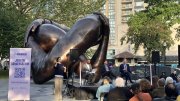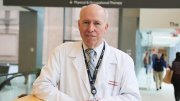Melanie Carr '97 once planned to go to law school, but her passion for social justice has led her to her own niche in public-interest law. She heads her own nonprofit, the New Orleans-based A Fighting Chance (www.a-fighting-chance.org), which provides investigation and mitigation services to indigent defendants facing capital punishment. "I found that investigation is a very difficult and compelling pursuit," Carr says. "The more I did it, the more I learned, and the better services I could provide. As I saw how few people were doing it, the idea for A Fighting Chance developed."
In college, Carr worked with the Phillips Brooks House Association to start the South Boston Big Siblings Program. "I realized, working in Southie, that forging individual connections with people in need can be incredibly powerful and transformative," she says; her own Little Sister, Ashlie Arcand, struggled successfully to graduate from high school and to enter college. Carr feels her current work is built on the same premise: personal relationships can be life-altering.
 |
| Melanie Carr (second from right) with client Ryan Matthews (far left) and his mother, sister, and attorneys on the day he was exonerated after seven years in jail. |
| Courtesy of A Fighting Chance |
While looking for jobs in public-interest law, the Massachusetts native began learning more about the plight of indigent defendants in the South; she cites a study conducted in New Orleans that examined 119 death-penalty cases and determined that when a thorough investigation was carried out from the moment of arrest, conviction rates dropped from 68 percent to 16 percent. "I decided to work in the Deep South," Carr says, "because that's the Death Belt--the heart of the criminal-justice and capital-defense struggle."
The nonprofit Louisiana Crisis Assistance Center (LCAC) hired her "as an experiment," she says. "They weren't happy working with private-eye-types and wanted to see if they could break the mold with a hard-working, enthusiastic person they could train on the job." Carr found that she could put her college anthropology to good use: mitigation work, she says, is a social-history analysis pieced together from a client's records, the testimonials of friends, family, and acquaintances, and whatever else is relevant to the case. Eventually she became LCAC's chief investigator. Then, in 2001, with fellow investigator Colleen Francis and a fellowship of $90,000 from Echoing Green (see "A Prescription for Change," September-October 2004, page 88), she started A Fighting Chance.
The two-year grant has expired, but the organization carries on, handling about 25 cases at a time and training local defense lawyers. For many clients, Carr provides an assessment for the jury of the circumstances that led to their violent acts. For other clients, she may need only to bring together necessary evidence missed by a defense lawyer short on time and money--but this can be surprisingly difficult. One former client, Ryan Matthews, was recently exonerated after spending seven years in jail, five on death row. Although another man had bragged about the murder for which Matthews was charged, and DNA testing affirmed that confession, A Fighting Chance had to bring this information together during the appeals process. "If Ryan's case had had some decent investigation done initially," Carr says, "it probably wouldn't have come to trial at all."
Carr, who carries out investigations and trains recruits in addition to directing the program, is continually challenged by her work. "The death penalty is...at the crossroads of many of society's problems, illustrating what can happen when we ignore or fail to adequately address them," she says. Clients have suffered everything from child abuse to abandonment to severe mental-health conditions, often without any effective intervention. "We see the impact of all these problems after the fact," she says. "It is our job to identify and present those factors to the sentencing jury, so they can make an informed judgment about what should happen to our clients."
~Emer Vaughn





